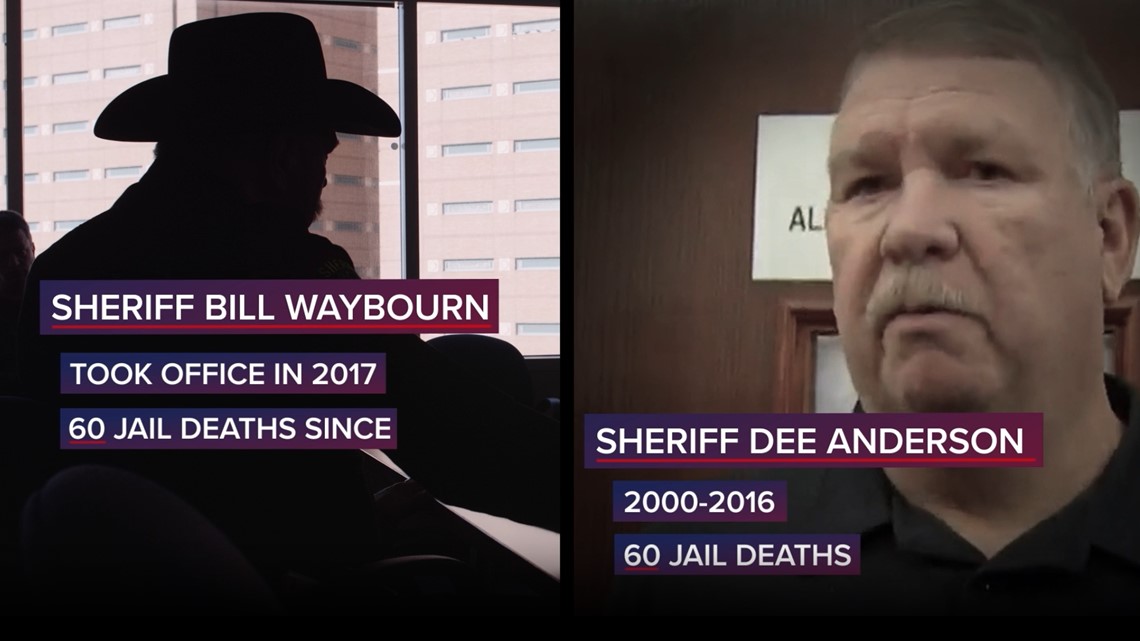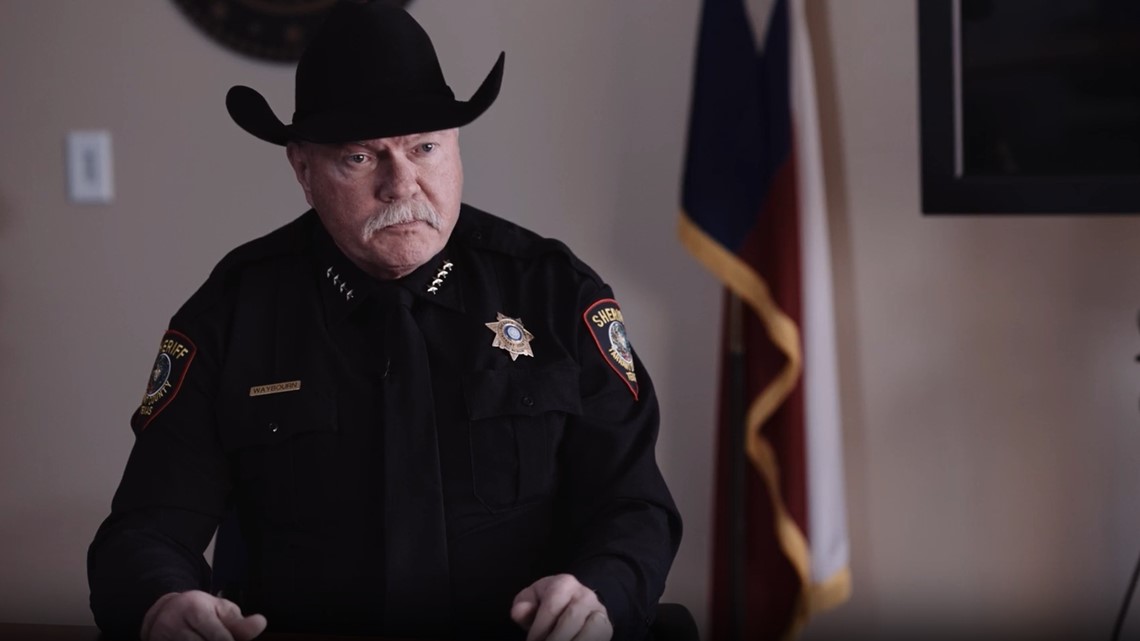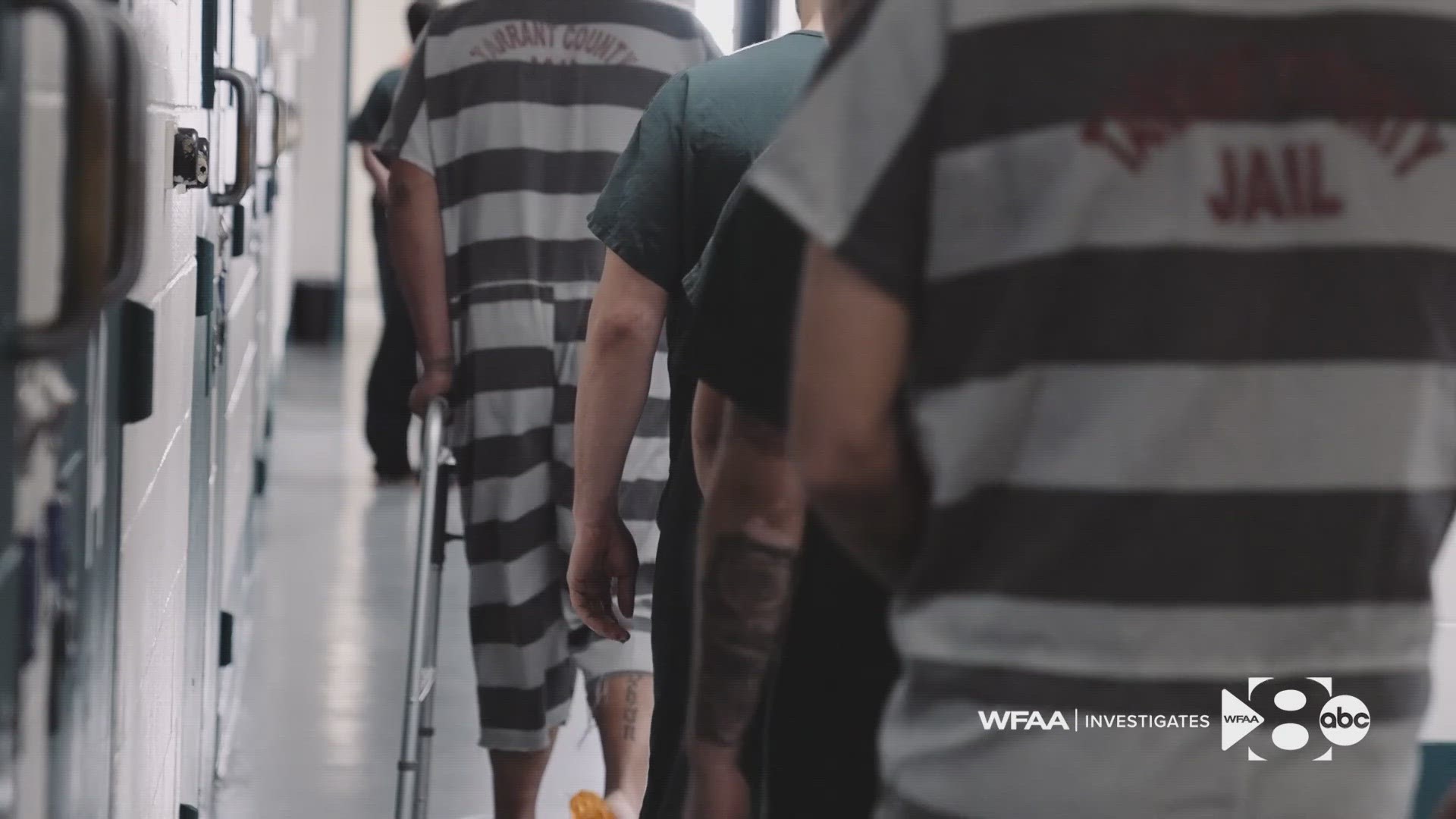FORT WORTH, Texas — The former Tarrant County Jail prisoner cradled two dolls and mourned the loss of her baby.
“I never got to hold her,” Chasity Congious told WFAA.
Congious, now 24, gave birth while in the Tarrant County Jail. She was six months pregnant when booked into jail in 2020. After she’d been in jail for several months on an assault case probation violation, Congious went into labor inside an infirmary cell.
Jailers and medical staff sitting a few feet away didn’t hear her cries. She gave birth alone. The umbilical cord wrapped around the baby’s neck, cutting off oxygen to the baby’s brain.
The baby, Zenorah, lived just 10 days.
“Chasity gave birth, and the baby wasn’t discovered until almost 40 minutes after birth was given,” Congious’ family attorney, Jarrett Adams, said.
“A lot of people dropped the ball and that’s how it happened,” Adams said. “And it will continue to happen unless the citizens of Tarrant County demand better.”
The death of Zenorah and others have put the jail and Tarrant County Sheriff Bill Waybourn under the microscope.
The jail’s annual mortality rate exceeded the national average in each of the last four years – though there’s been a steady decline since reaching a high point during the 2020 COVID pandemic.
Critics told WFAA that the jail lacks adequate staffing, training, and oversight, putting the lives of prisoners in danger. The jail is also about 200 detention officers short of full staffing, and jailers often work more than 50 hours a week.
Over the past two years, Tarrant County commissioners have agreed to $1.6 million in settlements. The county is currently negotiating to settle Congious’ case.
“The first thing I would say is that I wasn't agreeing to settlements,” Waybourn told WFAA. “I generally was not for that. And the other thing that I would say to people is that even when we did everything right, the person still died.”
Waybourn took office in 2017. Since then, 60 Tarrant County prisoners have died – an average of more than eight prisoners a year. (One additional Tarrant County prisoner died last year in a private jail in Garza County. Due to limited space, Tarrant County has about 500 prisoners housed there under a contract with a private jail company.)
By comparison, the previous sheriff recorded the same number of deaths in 16 years. That’s an average of 3.8 deaths a year.


When Congious was jailed, her mother, Kim Hammond, became concerned due to her disabilities. Congious is intellectually disabled, and she’s also bipolar and schizophrenic.
Her family says she should have been in a hospital receiving care rather than in jail.
“The reality of it is she needed help,” Hammond said. “This was not the place for her.”
The family’s lawsuit said a jail infirmary nurse reported that Chasity wouldn’t understand labor pains.
“She didn't know that she was in labor, but she knew her stomach was hurting pretty bad,” Hammond said.
In an interview, Waybourn told WFAA that Tarrant County runs “one of the safest and cleanest jails in America.” He said factors beyond the jail’s control have caused the number of deaths to spike.
Records show eight prisoners died from COVID-related causes. Another five died from drug overdoses.
Most of those who died suffered from chronic diseases and died under the supervision of doctors at the hospital, the sheriff said.
“In 99 percent of the cases, everything was done right and unfortunately somebody passed away,” the sheriff said.


Other folks disagree.
“Jail deaths are a problem,” said Commissioner Alisa Simmons, a frequent critic of the jail’s operations. “And unfortunately, they will continue to be a problem until the sheriff and the commissioner's court prioritize it and say, ‘We've got to do a number of things differently.’”


But it’s deaths like Javonte Myers that have brought unwelcome attention to the jail and its sheriff.
The 28-year-old died from a seizure inside his cell in June 2020. By the time jailers discovered his body, he’d been dead for hours.
Two jailers claimed to have checked on Myers. But a review of camera footage over a more than 7-hour period showed repeated failures to do cell checks.
Dean Malone, an attorney representing Myers’ family, said the case speaks to a systemic problem in the jail.
“If you think that you're doing an awesome job, you're never really going to look at what the problems are,” Malone said.
A Texas Rangers review found the jailers “did not complete the required 20 minutes checks at all or not properly...”
In fact, when a Texas Ranger interviewed jailer Erik Gay, he told the investigator that he couldn’t recall how many cell checks hadn’t occurred, nor “why they were not done.”
He told the Ranger that supervisors were aware that cell checks weren’t being done as required.
“It goes farther up than just officers,” Gay said.
Gay told the investigator that all the jail’s management cared about is “making the computer look good.”
“I think that was somebody trying to defend themselves,” Waybourn told WFAA. “They falsified government documents, and we charged them criminally with that.”
Randy Moore, an attorney representing Gay, said, “I will say that right back to him. That’s his response trying to defend himself.”
“It's interesting that the lowest person on the food chain is the only person that's been indicted for criminal conduct here,” Moore said.


Moore, who frequently defends jailers in similar cases, said when situations like this happen, it’s because of inadequate personnel, inadequate training, and inadequate supervision.
“The entire organization failed here,” Moore said. “The evidence of that is the fact that this isn’t the only time that this has happened.”
Two months before Myers’ death, Dean Stewart hung himself from a light fixture in his cell. Paramedics tried to revive him. He died on the floor of the cell.
State regulators found that jailers failed to do timely checks on Stewart.
A report by state regulators says that Stewart “claimed he was in jail for capturing an international terrorist and wanted to be exiled to another country,” and was seen “yelling at the camera and appeared disheveled, angry, agitated, uncooperative and delusional.”
According to state regulators, Stewart was scheduled to see a mental health provider on April 27, 2020, the day after he killed himself. A Texas Rangers report says he was not on “suicide watch” but was in a mental health pod, requiring more “frequent face-to-face observations.”
In that case, the sheriff says one of the jailers had made a mistake recording the timing of cell checks. That resulted in other jailers getting behind on checks.
“It was nothing of malice like the other case,” Waybourn said. “We thought we were doing it right and so their checks were off.”
Waybourn also said that the jail stopped more than 270 attempted suicides last year.
Since the deaths of Myers and Stewart, the jail has installed a new electronic cell check system.
Jailers making cell rounds use a small baton to do their checks.
“The officer just has to walk by and push the button, and it collects the data,” said Chief Deputy Charles Eckert, who oversees jail operations.
The baton will hold about a million cell checks, so even if someone forgets to download it, the data remains in the device, he said.
Eckert said jailers do more than 80,000 cell checks a day, and supervisors do frequent, random audits to ensure that checks are being done. He also says the jail goes above and beyond the standard set by the state in terms of doing the cell checks.
“We are very, very proactive about making sure those checks are getting properly,” Eckert said.
The county settled the Myers case for $1 million. Another $400,000 settlement went to Stewart’s family.
At a recent town hall meeting, Waybourn answered WFAA’s questions about Chasity’s case. He called it a tragedy.
He said she was being checked on every eight to nine minutes.
Asked how Chasity could have given birth if she had been checked frequently, Waybourn said that she had her bed covers pulled up, and the jailer couldn’t see that she was in labor until too late.
“I believe they did everything they could, and I think it was just unfortunate that the whole incident occurred,” Waybourn said.


Kim Hammond, Chasity’s mother, doesn’t believe jailers could have been properly checking on Chasity given that she was able to birth a baby alone in that cell.
“Zenorah was a healthy baby, beautiful, healthy baby girl,” Hammond said. “There is no way that we would have been sitting here if they would have helped us by helping Chastity to deliver the baby.”
She says Chasity’s mental state dramatically deteriorated since the events that occurred in the county jail. She spent weeks in a county-run mental health unit.
Her mother says she can no longer be left alone. She says Chasity suffers from frequent hallucinations and manic outbursts.
No pictures hang on the walls of the family’s apartment. Hammond says those can trigger a manic episode.
Chasity remains on probation for an assault case that occurred prior to the death of Zenorah. Prosecutors have sought the revocation of her probation, and a warrant has been issued for her arrest.
Hammond and her attorney said the probation officer was aware that Chasity’s been in and out of the psychiatric ward.
“Tarrant County continues to criminalize her mental health,” Adams said.

